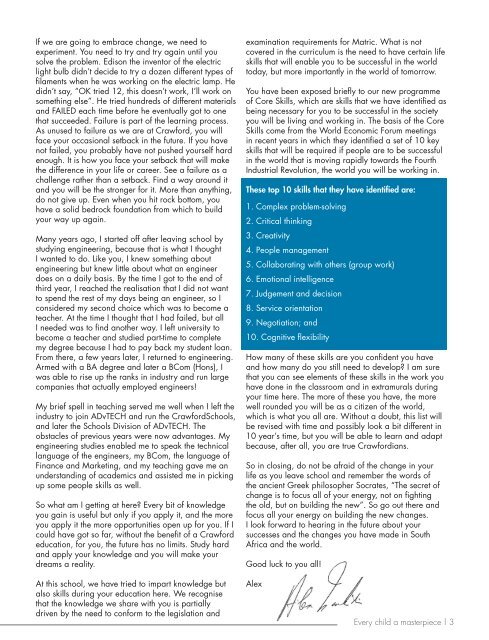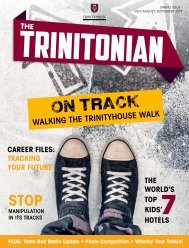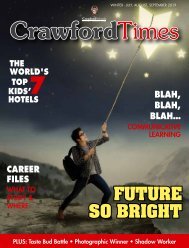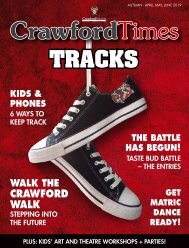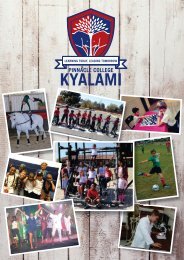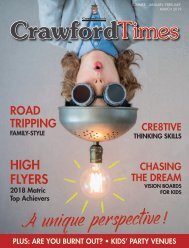JANUARY CRAWFORD ONLINE ISSUE JAN 2018
Create successful ePaper yourself
Turn your PDF publications into a flip-book with our unique Google optimized e-Paper software.
If we are going to embrace change, we need to<br />
experiment. You need to try and try again until you<br />
solve the problem. Edison the inventor of the electric<br />
light bulb didn’t decide to try a dozen different types of<br />
filaments when he was working on the electric lamp. He<br />
didn’t say, “OK tried 12, this doesn’t work, I’ll work on<br />
something else”. He tried hundreds of different materials<br />
and FAILED each time before he eventually got to one<br />
that succeeded. Failure is part of the learning process.<br />
As unused to failure as we are at Crawford, you will<br />
face your occasional setback in the future. If you have<br />
not failed, you probably have not pushed yourself hard<br />
enough. It is how you face your setback that will make<br />
the difference in your life or career. See a failure as a<br />
challenge rather than a setback. Find a way around it<br />
and you will be the stronger for it. More than anything,<br />
do not give up. Even when you hit rock bottom, you<br />
have a solid bedrock foundation from which to build<br />
your way up again.<br />
Many years ago, I started off after leaving school by<br />
studying engineering, because that is what I thought<br />
I wanted to do. Like you, I knew something about<br />
engineering but knew little about what an engineer<br />
does on a daily basis. By the time I got to the end of<br />
third year, I reached the realisation that I did not want<br />
to spend the rest of my days being an engineer, so I<br />
considered my second choice which was to become a<br />
teacher. At the time I thought that I had failed, but all<br />
I needed was to find another way. I left university to<br />
become a teacher and studied part-time to complete<br />
my degree because I had to pay back my student loan.<br />
From there, a few years later, I returned to engineering.<br />
Armed with a BA degree and later a BCom (Hons), I<br />
was able to rise up the ranks in industry and run large<br />
companies that actually employed engineers!<br />
My brief spell in teaching served me well when I left the<br />
industry to join ADvTECH and run the CrawfordSchools,<br />
and later the Schools Division of ADvTECH. The<br />
obstacles of previous years were now advantages. My<br />
engineering studies enabled me to speak the technical<br />
language of the engineers, my BCom, the language of<br />
Finance and Marketing, and my teaching gave me an<br />
understanding of academics and assisted me in picking<br />
up some people skills as well.<br />
So what am I getting at here? Every bit of knowledge<br />
you gain is useful but only if you apply it, and the more<br />
you apply it the more opportunities open up for you. If I<br />
could have got so far, without the benefit of a Crawford<br />
education, for you, the future has no limits. Study hard<br />
and apply your knowledge and you will make your<br />
dreams a reality.<br />
examination requirements for Matric. What is not<br />
covered in the curriculum is the need to have certain life<br />
skills that will enable you to be successful in the world<br />
today, but more importantly in the world of tomorrow.<br />
You have been exposed briefly to our new programme<br />
of Core Skills, which are skills that we have identified as<br />
being necessary for you to be successful in the society<br />
you will be living and working in. The basis of the Core<br />
Skills come from the World Economic Forum meetings<br />
in recent years in which they identified a set of 10 key<br />
skills that will be required if people are to be successful<br />
in the world that is moving rapidly towards the Fourth<br />
Industrial Revolution, the world you will be working in.<br />
These top 10 skills that they have identified are:<br />
1. Complex problem-solving<br />
2. Critical thinking<br />
3. Creativity<br />
4. People management<br />
5. Collaborating with others (group work)<br />
6. Emotional intelligence<br />
7. Judgement and decision<br />
8. Service orientation<br />
9. Negotiation; and<br />
10. Cognitive flexibility<br />
How many of these skills are you confident you have<br />
and how many do you still need to develop? I am sure<br />
that you can see elements of these skills in the work you<br />
have done in the classroom and in extramurals during<br />
your time here. The more of these you have, the more<br />
well rounded you will be as a citizen of the world,<br />
which is what you all are. Without a doubt, this list will<br />
be revised with time and possibly look a bit different in<br />
10 year’s time, but you will be able to learn and adapt<br />
because, after all, you are true Crawfordians.<br />
So in closing, do not be afraid of the change in your<br />
life as you leave school and remember the words of<br />
the ancient Greek philosopher Socrates, “The secret of<br />
change is to focus all of your energy, not on fighting<br />
the old, but on building the new”. So go out there and<br />
focus all your energy on building the new changes.<br />
I look forward to hearing in the future about your<br />
successes and the changes you have made in South<br />
Africa and the world.<br />
Good luck to you all!<br />
At this school, we have tried to impart knowledge but<br />
also skills during your education here. We recognise<br />
that the knowledge we share with you is partially<br />
driven by the need to conform to the legislation and<br />
Alex<br />
Every child a masterpiece | 3


